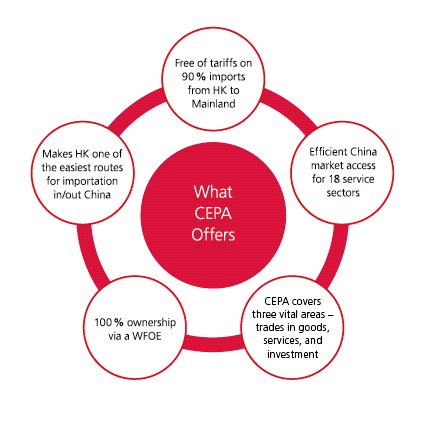CEPA covers three areas – trades in goods, services and investment facilitation. Since 2003, all goods originating from Hong Kong and entering the mainland benefit from tariff-free treatment, upon approval by local manufactures. The Hong Kong service sector, too, enjoys preferential treatment when entering binding contracts on mutual recognition of professional collaborations. Mainland China and Hong Kong have also agreed to enhance investment facilitation aspects to improve the overall business and trading environment.
By adopting a building block approach (as stipulated in the CEPA legal text), the agreed liberalisation offers advantageous opportunities for foreign companies looking to expand into the China market. This approach requires an interested foreign company or firm to apply for Hong Kong Service Provider (HKSP) status, an application that is submitted in Hong Kong. The firm’s scope of business, as stated in the HKSP application, must be identical to their intentions in mainland China. The company may be of any nationality but needs to meet certain requirements: it must have done business in Hong Kong for 3-5 years and thus be liable for Hong Kong tax, and to have employed over 50 percent national workers. It is important to note that there are certain industry restrictions in mainland China; the two major areas are telecommunications and energy services.
Establishing a company as a HKSP to enter China through the CEPA can be difficult. However, foreign companies must take into consideration how long it takes to establish operations in China itself. Entering into a Restricted Industry (RI) in mainland China requires a Joint Venture (JV) with a domestic Chinese company, a process that can take over a year before operations can commence. If the foreign firm places a premium on establishing a Wholly Foreign-Owned Enterprise (WFOE) instead of a JV, it should consider entering China via the CEPA. Even though a WFOE inevitably comes with its own set of risks, many foreign firms feel a WFOE offers the time, control and ownership they desire.
Due to the social and economic ties between Hong Kong and mainland China, it has become virtually impossible for businesses to operate in one and not the other. To maintain the superior liberalization of CEPA, the Central Government has pledged to achieve the freedom of trade in services between the mainland and Hong Kong. Despite the abundant capital in mainland China, Hong Kong is still considered one of Asia’s leading financial centres and it stands to benefit from the mainland’s supply-side strengths when promoting further business and maintaining existing advantages.
Author
Richard Hoffmann
ECOVIS R&G Consulting Ltd (BJ), Beijing, China

